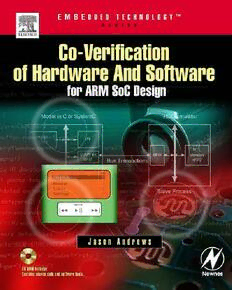Download Co-verification of Hardware and Software for ARM SoC Design PDF Free - Full Version
Download Co-verification of Hardware and Software for ARM SoC Design by Jason R. Andrews in PDF format completely FREE. No registration required, no payment needed. Get instant access to this valuable resource on PDFdrive.to!
About Co-verification of Hardware and Software for ARM SoC Design
Hardware/software co-verification is how to make sure that embedded system software works correctly with the hardware, and that the hardware has been properly designed to run the software successfully -before large sums are spent on prototypes or manufacturing. This is the first book to apply this verification technique to the rapidly growing field of embedded systems-on-a-chip(SoC). As traditional embedded system design evolves into single-chip design, embedded engineers must be armed with the necessary information to make educated decisions about which tools and methodology to deploy. SoC verification requires a mix of expertise from the disciplines of microprocessor and computer architecture, logic design and simulation, and C and Assembly language embedded software. Until now, the relevant information on how it all fits together has not been available. Andrews, a recognized expert, provides in-depth information about how co-verification really works, how to be successful using it, and pitfalls to avoid. He illustrates these concepts using concrete examples with the ARM core - a technology that has the dominant market share in embedded system product design. The companion CD-ROM contains all source code used in the design examples, a searchable e-book version, and useful design tools. * The only book on verification for systems-on-a-chip (SoC) on the market * Will save engineers and their companies time and money by showing them how to speed up the testing process, while still avoiding costly mistakes * Design examples use the ARM core, the dominant technology in SoC, and all the source code is included on the accompanying CD-Rom, so engineers can easily use it in their own designs
Detailed Information
| Author: | Jason R. Andrews |
|---|---|
| Pages: | 285 |
| Language: | English |
| File Size: | 3.814 |
| Format: | |
| Price: | FREE |
Safe & Secure Download - No registration required
Why Choose PDFdrive for Your Free Co-verification of Hardware and Software for ARM SoC Design Download?
- 100% Free: No hidden fees or subscriptions required for one book every day.
- No Registration: Immediate access is available without creating accounts for one book every day.
- Safe and Secure: Clean downloads without malware or viruses
- Multiple Formats: PDF, MOBI, Mpub,... optimized for all devices
- Educational Resource: Supporting knowledge sharing and learning
Frequently Asked Questions
Is it really free to download Co-verification of Hardware and Software for ARM SoC Design PDF?
Yes, on https://PDFdrive.to you can download Co-verification of Hardware and Software for ARM SoC Design by Jason R. Andrews completely free. We don't require any payment, subscription, or registration to access this PDF file. For 3 books every day.
How can I read Co-verification of Hardware and Software for ARM SoC Design on my mobile device?
After downloading Co-verification of Hardware and Software for ARM SoC Design PDF, you can open it with any PDF reader app on your phone or tablet. We recommend using Adobe Acrobat Reader, Apple Books, or Google Play Books for the best reading experience.
Is this the full version of Co-verification of Hardware and Software for ARM SoC Design?
Yes, this is the complete PDF version of Co-verification of Hardware and Software for ARM SoC Design by Jason R. Andrews. You will be able to read the entire content as in the printed version without missing any pages.
Is it legal to download Co-verification of Hardware and Software for ARM SoC Design PDF for free?
https://PDFdrive.to provides links to free educational resources available online. We do not store any files on our servers. Please be aware of copyright laws in your country before downloading.
The materials shared are intended for research, educational, and personal use in accordance with fair use principles.

